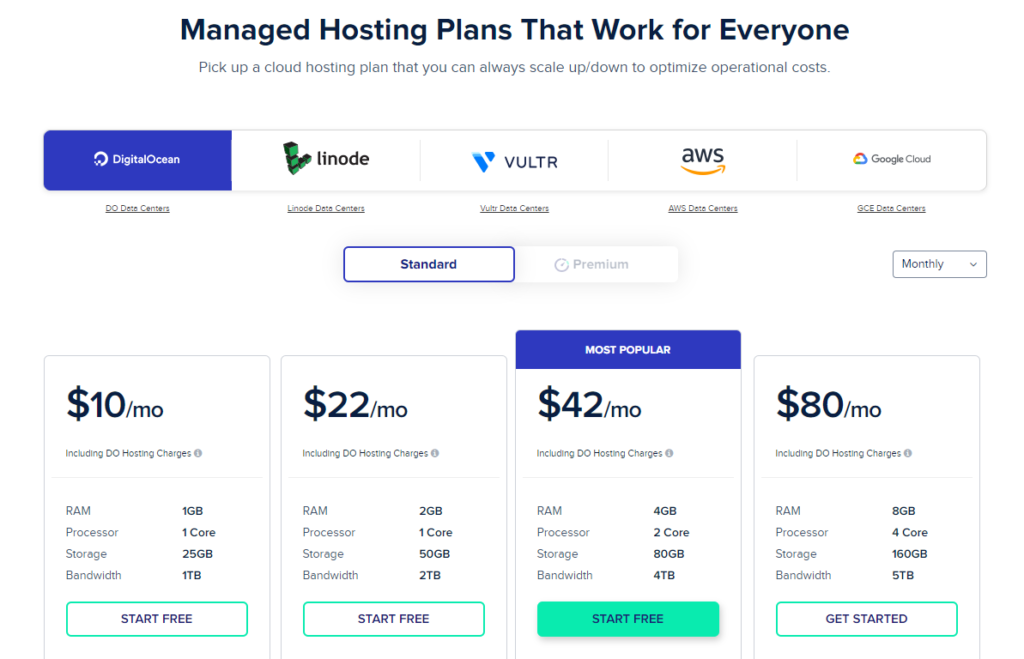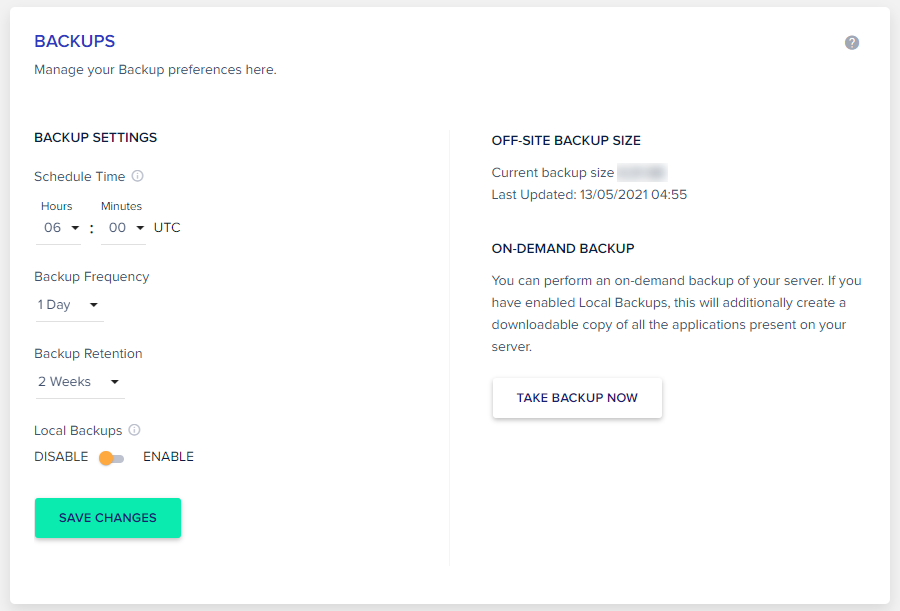Web hosting is required when you want to create any sort of website. Without it, you have nowhere to store the contents of that site.
No matter what kind of business you own, it’s extremely beneficial to have a web presence. And if you run a purely online business or do affiliate marketing, a website is all but required.
Simply put, if you don’t have a website, you’re leaving big money and brand awareness on the table.
Of course, when you build a website, you want to choose a high-quality web host that is reliable, fast, and affordable. There are certainly a lot of options out there.
And then there’s Cloudways. Founded in 2009 by Aaqib Gadit, Pere Hospital and Uzair Gadit, Cloudways is a Malta-based company that has grown into one of the best managed cloud hosting providers in the world, with over 100 employees and features in top publications like Forbes and PC Magazine.
Years ago, I wrote my review of SiteGround. I had hosted my websites with them for many years, but I felt that they were going downhill and wanted to look for something better. This is what led me to discover Cloudways and try them out.
In this article, I’m going to write a comprehensive Cloudways review so you can answer these questions for yourself:
How can Cloudways and its web hosting capabilities serve my needs?
Is it a good service? Is it worth the cost?
If you’re interested in Cloudways and are on the fence, this review will hopefully give you the push you need to make your decision.
Here’s what I’m going to be covering in the review:
- What can Cloudways do?
- Cloudways Technologies
- A Quick Tour Of Cloudways
- Cloudways Pros
- Cloudways Cons
- Cloudways Pricing
- Frequently Asked Questions
- Conclusion
If you’re ready to try Cloudways at this point, click the button below to set up a free trial (no credit card info required) or scroll down to the bottom of my review to see my final verdict!
What can Cloudways do?

Cloudways specializes in one particular type of web hosting: cloud hosting. Strictly speaking, they are a managed cloud hosting platform.
Unlike the typical shared hosting services that you would find with popular, accessible web hosts like Bluehost, SiteGround or HostGator, a cloud hosting service uses a network of dedicated servers to store and serve your content.
With cloud hosting, the performance of your website is much more reliable and is not affected by the resource demands of other users. The main benefits are better uptime, better performance, a dedicated IP address, and easy scaling.
In terms of performance, cloud hosting is undoubtedly superior to shared hosting. But one of the main drawbacks is that it’s less accessible and requires “techie” knowledge in order to run a server effectively.
This is where Cloudways comes in. Cloudways makes the task of setting up and maintaining cloud hosting servers as easy as possible — nearly as easy as running shared hosting with an all-in-one hosting company.
Cloudways works with many of the world’s best cloud hosting providers. Currently, they are DigitalOcean, Linode, Vultr, AWS, and Google Cloud.
Working with these cloud hosting providers directly would be difficult and require specialized technical knowledge. Cloudways takes care of the technical aspects for you; they essentially simplify the process of running cloud hosting so that it’s accessible to people with little web development knowledge (like myself).
Here are some of the main features of Cloudways hosting that would be useful for owners of blogs, e-commerce sites, and agency businesses:
- complete control over applications and servers using a unique control panel
- the ability to scale resources (RAM, CPU, storage) as traffic to your site increases
- support for the latest versions of PHP, MySQL, MariaDB, etc.
- the ability to host unlimited websites on a server
- easy website migration from another host
- strong WordPress support
- 24/7 real-time monitoring
- automatic backups
- caching systems
Cloudways has a ton of features and it would be impractical to discuss them all here. You can get details on all of them here.
As you read more of this review, you’ll gain a much better understanding of the benefits of Cloudways and why it’s my current web host.
Cloudways Technologies
The sheer scale of what I could discuss here would warrant its own page. But right now, I’ll divide the section into two main subsections: performance and security.
Performance
Cloudways makes special adjustments and optimizations to their servers to achieve among the best cloud hosting performance in the world. They offer (not limited to):
- A uniquely optimized stack: built-in advanced caches using NGINX, Memcached, Varnish and Redis dramatically speed up response time.
- A dedicated environment: servers use dedicated resources, avoiding the pitfalls of shared hosting.
- The latest PHP versions: uses the faster PHP 7 and allows you to select the specific PHP version.
- SSD storage: 3x faster than regular HDD storage.
- HTTP/2 support: this protocol increases communication speed between clients and web servers.
- An in-house WordPress caching plugin: called Breeze, it is a very effective caching system that is pre-installed on Cloudways.
- Auto-healing restarts: resolves most server issues, preventing crashing.
- A Magento full-page cache: significantly improves the performance of Magento stores.
In addition, Cloudways allows you to choose from over 60 different data centers around the world, so your content can be as close as possible to your target audience.
Cloudways stays on top of the latest cutting-edge hosting technologies meant to take your website to the next level of performance.
Security
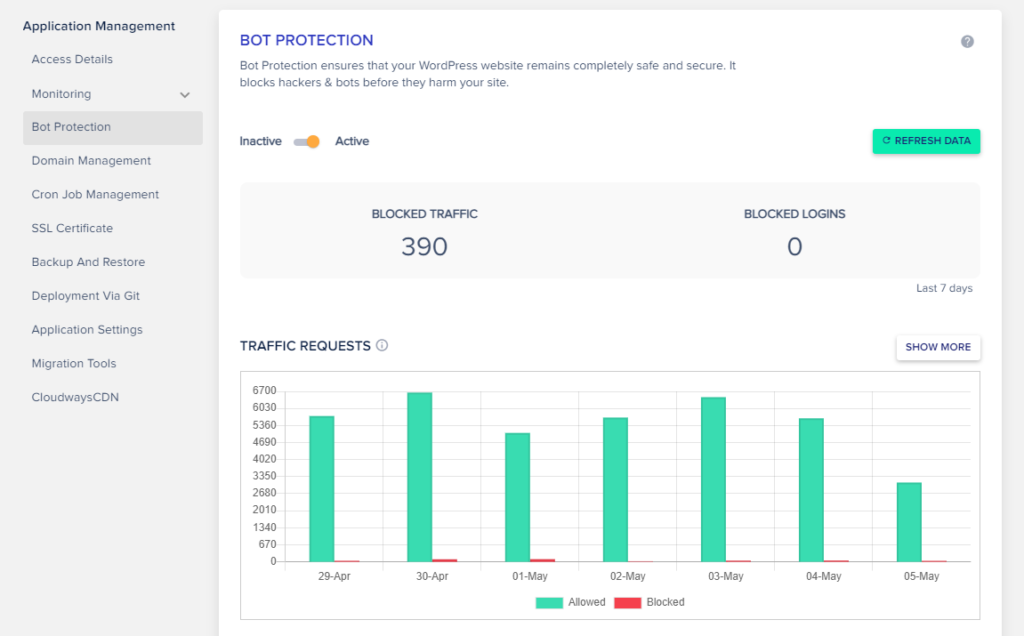
Cloudways goes to more lengths to secure your websites than most other web hosts that I can think of.
A good example of this is their integrated bot protection plugin called Bot Protection, in partnership with MalCare. This technology identifies traffic surges and blocks malicious bot traffic. Detailed reporting of bot traffic that arrives at your site is provided within the Cloudways platform.
Bot Protection does not appear to slow down your website at all, and I definitely recommend enabling it.
In addition, Cloudways offers:
- Operating system firewalls: these further filter out malicious traffic.
- Regular security patching: protects against vulnerabilities.
- Two-factor authentication: an extra layer of security for your Cloudways server.
- A 1-click free SSL installation: improves website security and can be set to automatically renew.
- IP whitelisting: you can create a whitelist of IPs that allow unrestricted access to SFTP and SSH.
There are many other things you can do on the Cloudways platform. You have complete control over how you manage your server, there is an array of workflow and collaboration features, you can monitor your resource usage, and you can take advantage of several optional integrations & add-ons.
A Quick Tour Of Cloudways
In this section, I’ll give you an overview of setting up a Cloudways account and give you a brief tour of the user area. It’s actually very easy for non-developers to use Cloudways, which you’re about to see.
1. Signing Up
Cloudways offers a three-day trial of their services with no credit card info required. Everyone should take advantage of this offer.
On the main Cloudways home page, click on the “Start Free” button in the top-right corner. Enter in your details including name, email, and background, and then create your account.
Tip: You can often find some good promo codes that give you a deal on Cloudways hosting by doing a simple internet search.
2. Choosing A Server
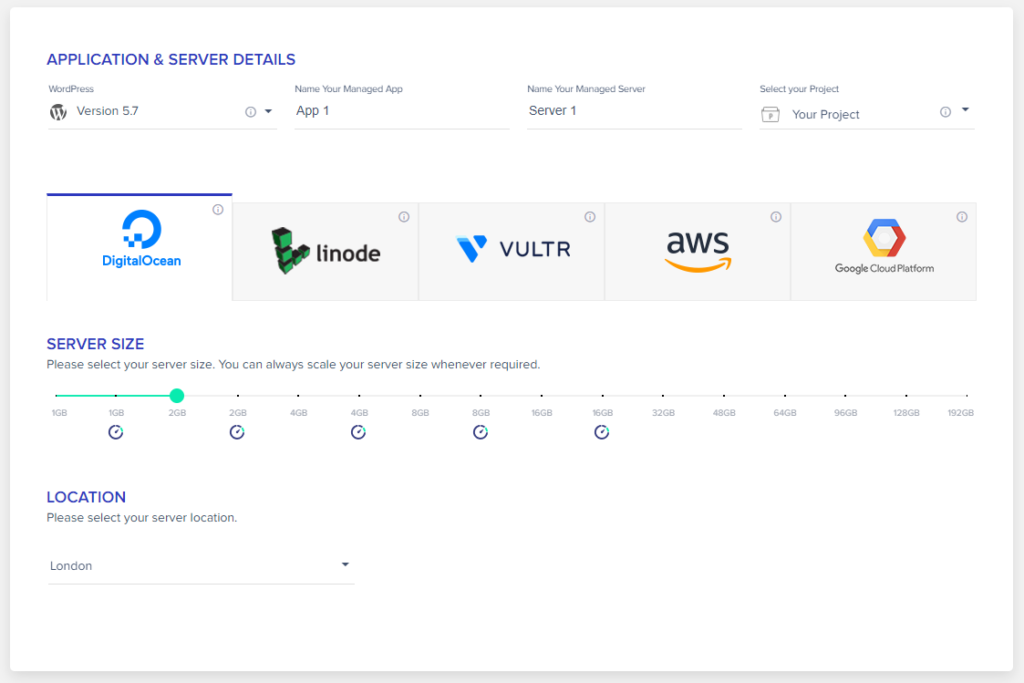
Next, you’ll be taken to a page where you create your server. This server can hold an unlimited number of applications, and in our case, an application is an individual website.
On this page, you can also create your initial application to be paired with the server. If you’re running WordPress sites, select WordPress.
At the time of writing, Cloudways offers the five hosting infrastructures that I mentioned in a previous section. Amazon Web Services (AWS) and Google Cloud are the most powerful options, but they are also more expensive than Linode, Vultr and DigitalOcean.
This section won’t get into which providers you should choose in different situations, but I myself picked a Vultr High-Frequency server and am very happy with it.
You also need to choose your server size and location. Choose a server location closest to the bulk of your target audience.
Once done, hit the “Launch Now” button.
3. Exploring Server Options
In the “Servers” tab on Cloudways, you can view the servers you’ve set up within your account. From here, you can view the number of applications, projects and members for a server at a glance.
Once you select a server, you’ll have quick access to your server IP address, username and password, which are required for SFTP or SSH access as well as other applications.
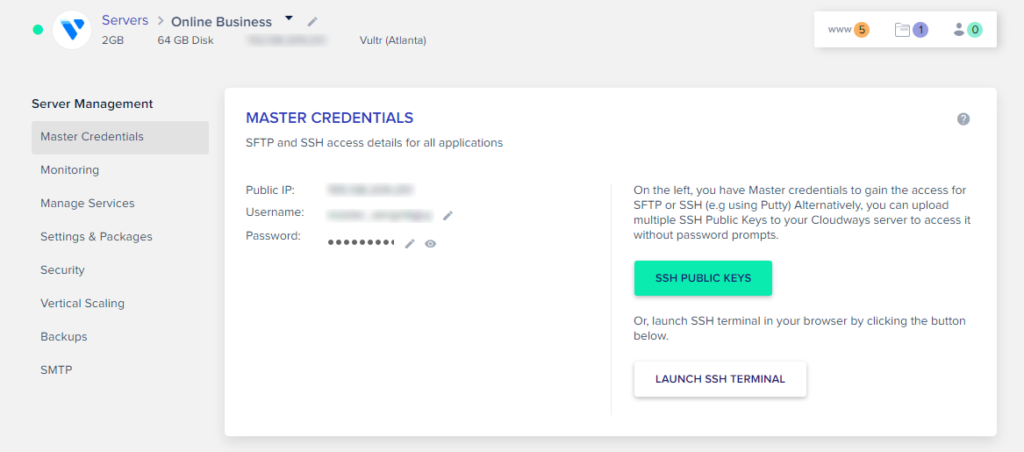
From the server section of your Cloudways user area, you can also access the following settings:
- Monitoring: view information on server resource usage (RAM, CPU, disk space, etc.), and view graphs of your resource usage over time.
- Manage Services: enable, stop, or restart various core services that affect the running of your applications. Examples include Apache, Memcached, MySQL, Redis and Varnish.
- Settings & Packages: control server-level settings related to uploads, memory, buffers, etcetera. This is a technical section best left to developers. You can also select your PHP and MySQL versions here.
- Security: manage permissions for access to SFTP/SSH and MySQL.
- Vertical Scaling: increase your server size if more resources are needed. This will put you on a different monthly rate.
- Backups: manage your backup preferences such as time, frequency, and retention time. You can also take on-demand backups here.
- SMTP: allow outgoing email delivery on your server by adding an SMTP host.
When running your websites on Cloudways, you’re likely to spend a lot of time in the server section. Note that you can quickly and easily view your server RAM & disk space configuration, IP address, and server location at the top.
4. Exploring Application Options
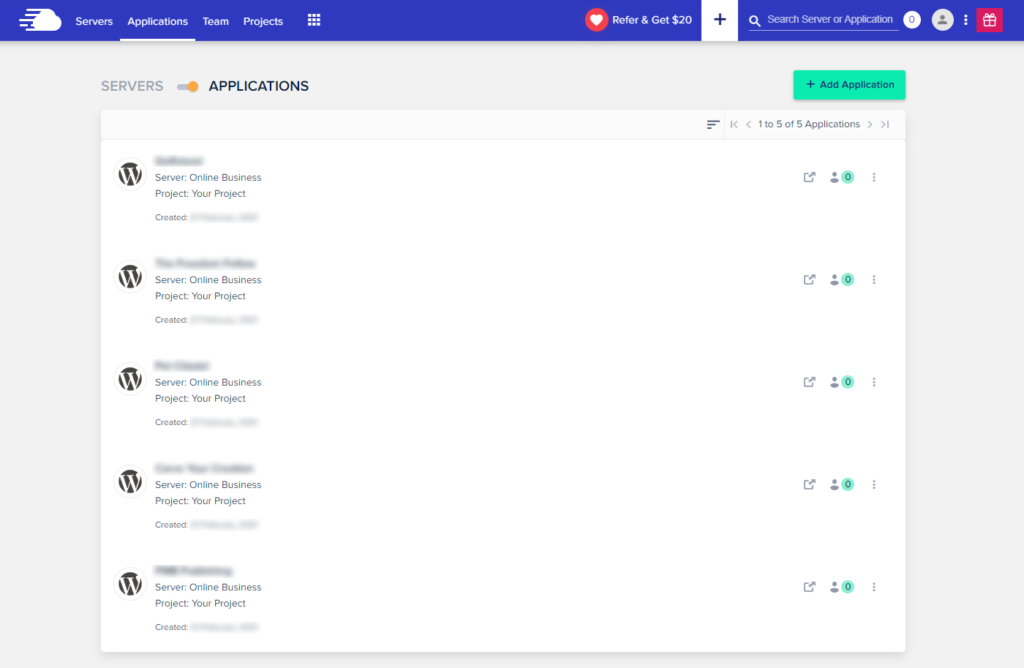
In the “Applications” tab on Cloudways, you can view the applications you’ve set up on a particular server.
The first thing you’ll see when you select an application are the access details: URL, admin login info (for WordPress installations), and MySQL access information. You probably won’t need to use this very often, especially if you change your WordPress logins and the info within Cloudways becomes inaccurate.
In the “Application Management” navigation on the left-hand side, there are many options. Typical website owners and online marketers will likely not need to touch or worry about things like Cron Job Management or Deployment Via Git.
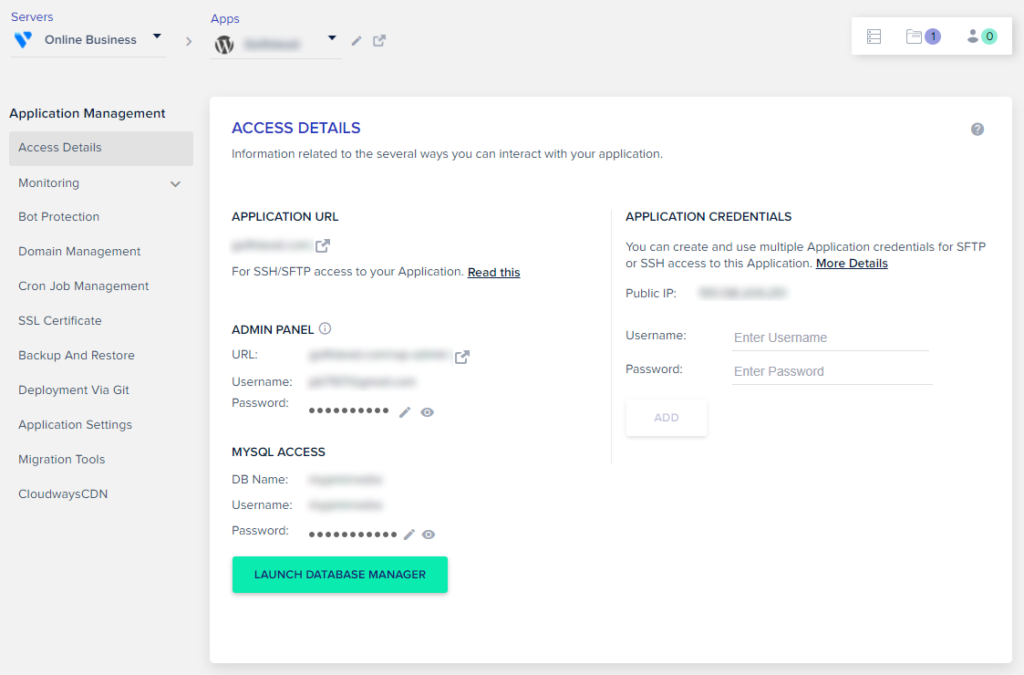
The most useful application sections are:
- Monitoring: monitor traffic, disk usage, and other elements on your website. Here, you can view bot traffic and IP/URL requests for anything suspicious or out of the ordinary.
- Bot Protection: enable/disable the Bot Protection plugin (mentioned before) and view bot traffic and login data.
- Domain Management: connect your custom domain name with your app (essential).
- SSL Certificate: set up a Let’s Encrypt SSL certificate for your website (very important these days).
- Backup And Restore: take backups of your application or restore the application to a previous backup. This can be very useful in the event you accidentally break your site.
- Application Settings: some important optimization-related settings are here such as the Varnish cache and HTTPS Redirection.
The Cloudways UI allows you to select a server and application quickly with drop-down menus, which I find very convenient myself.
Of course, there are many other things you can do within the Cloudways platform. If you work on a team, you can take advantage of the “Team” and “Projects” sections. There’s also sections for add-ons and an API.
Lastly, to get support, just click on the blue button on the right edge of your screen that says “need a hand?”. Here, you can look through the Knowledge Base, connect with an agent on live chat (24/7), create a ticket for more serious support, or view the community forums.
Cloudways Pros
1. It’s really fast and well-optimized.

Practically everyone who talks about Cloudways hosting praises its speed and loading times, which are allegedly far better than popular web hosts like Bluehost, HostGator, Hostinger, and even SiteGround.
Having used Cloudways as well as several of these other “mainstream” web hosts, I can definitively confirm the truth of this. Cloudways is really fast.
It’s difficult to use numbers to convey how much of a speed improvement Cloudways is over other web hosts because it depends on so many factors including the infrastructure (DigitalOcean, Linode, Vultr, etc.), server location relative to the end user, optimizations, and more.
I will say this, though: I used SiteGround shared hosting for years and thought it was pretty fast. But once I moved my websites over to Cloudways, there was an obvious and quite drastic increase in speed. I would say that loading times decreased by at least half.
Indeed, tests with tools such as GTmetrix show that Cloudways tends to be at least 2x faster than your typical web host.
Don’t trust me on this? Sign up for a Cloudways free trial, copy your sites over, and see for yourself. If you’re using one of the mainstream hosts that I’ve mentioned in this review, especially if you’re on shared hosting, I’m very confident that you will see a huge performance improvement.
2. It’s much more economical than other cloud hosting solutions.

This, combined with the very fast speeds, is really what sets Cloudways apart as my web host of choice. You simply can’t beat the cost given the terrific performance of the hosting and given the fact that it’s a managed solution.
For internet marketers like me that manage several blogs, you can run a high-performing Vultr High-Frequency server with 2GB of RAM and 64GB of storage space for just $26/month. This server has more than enough resources to handle a decent amount of daily search engine traffic.
Take SiteGround, in comparison. Their cloud hosting solutions start at $100/month, and that’s just the entry-level plan. The regular Business plan costs a mind-boggling $200/month.
Why is their cloud hosting so ridiculously expensive compared to Cloudways? I have no idea, and the kicker is that it’s not even better than Cloudways hosting!
Other cloud hosting solutions offered by web hosts such as Hostinger and HostGator are much more reasonably priced, but people have found that their performance is not nearly as good as Cloudways.
Let’s compare it to shared hosting too, which is obviously inferior to cloud hosting. The regular price of SiteGround shared hosting is $25/month for the mid-tier plan and $40/month for the high-tier plan. This means that, with SiteGround, you’re actually paying the same or more for inferior hosting.
If you take into account promotional prices and prices of other shared web hosts, you see that the monthly cost is comparable to that of Cloudways, even though Cloudways hosting is much better than shared hosting!
But the difference becomes even more stark when you consider that Cloudways hosting is pay-as-you-go, not contract-based. Unlike typical shared web hosting that locks you into a yearly contract, you can cancel your Cloudways hosting at any time.
3. It offers a very powerful caching system.

Cloudways offers a unique and powerful stack, which includes a multi-layer caching system. Once you finish setting up your site properly, this will consist of:
- Breeze: this is Cloudways’ in-house WordPress caching plugin that performs caching at the page level. It’s an efficient, fast plugin that also allows you to configure CDN settings and Varnish.
- Varnish: this cache is known as a caching HTTP reverse proxy. It’s a web application accelerator that can reduce delivery and loading times substantially. Varnish comes pre-installed on all Cloudways servers but must be enabled manually.
- Redis: this is an object cache that is available on Cloudways servers as an optional install. You need to make a couple of server/application adjustments to enable it, but it will speed up the backend of your website.
All of these caching systems can be enabled simultaneously to supercharge your website performance.
None of the mainstream web hosts that I’ve had experience with offer this kind of caching layer. It’s another factor that sets Cloudways apart from the rest in terms of performance.
4. The unique Cloudways user area is easy to navigate.
The Cloudways platform doesn’t use a traditional cPanel like most other web hosts do. They have their own, unique user area that makes it easy to access all of the important tools related to your server and applications.
I talked about the user area in the tour section of the review, so you can refer to that if you want to get an idea of how it’s set up, or simply sign up for the Cloudways free trial and explore yourself.
I find it very easy to access everything I need within the user area. It’s fast, and almost every important setting you’ll need to get to will fall under the “Server” or “Application” tabs.
One feature that I find really nifty is being able to select a different app (or website) from the drop-down menu and immediately be taken to the same section corresponding to that app.
5. Website migration is made easy.

Of course, there’s always the issue of moving your web properties from your old web host to your new web host. Cloudways makes this task as easy as possible.
While more and more web hosts are, perhaps greedily, moving to paid professional website transfers (including SiteGround, which used to offer a free transfer), Cloudways continues to offer one free migration for each new user. In addition to their extremely economical hosting services, this is icing on the cake.
In addition to this, you can easily migrate websites to Cloudways using their special migrator plugin. I myself used this to move my sites over in very little time at all, and it went very smoothly without problems.
You can, of course, migrate your websites over to Cloudways manually, and you may consider this option if you’re moving non-WordPress sites. Cloudways provides a detailed guide on the different ways to migrate your websites here.
Cloudways Cons
1. Customer support isn’t the greatest.
Over the years, Cloudways has been notorious for its complaints about lackluster and even downright poor customer support.
Customer support was the worst in the years following the launch of the platform, but in recent years, Cloudways has made real efforts to improve their customer support experience.
Despite this, there is still a lot of room for improvement. Unfortunately, I see where people are coming from when they criticize Cloudways support.
Live Chat
One annoying thing they do is put a “CloudwaysBot” in front of you. This is an automated system that is supposed to provide answers to your questions, hopefully without you needing to connect with a support rep.
In my experience, the CloudwaysBot is very annoying. I’d already be able to find answers to basic questions in the Knowledge Base, so it’s just a nuisance to me. It can be frustrating trying to click through the different options before you are finally transferred to a real person.
In time, I found out that you can just write some gibberish in the chat and you’ll be connected to a support rep right away. Keep this in mind before you waste your time with the CloudwaysBot.
As for the support itself, you can usually connect with an agent in a reasonable amount of time, sometimes almost instantly. I have found that most of the agents are not native English speakers and seem to be Middle Eastern. They can usually answer your questions, but sometimes they are not helpful at all, and they are often slow to respond.
Support reps can also cause unnecessary confusion. In one case, they sent me on a wild goose chase because my admin-ajax usage was high. They said that I should decrease my ajax requests, but it turned out that the usage was normal and not a cause for concern.
Overall, I would say that live chat is quite convenient (when you know how to quickly bypass the CloudwaysBot) and decently helpful, but there are clearly areas that should be improved.
Tickets
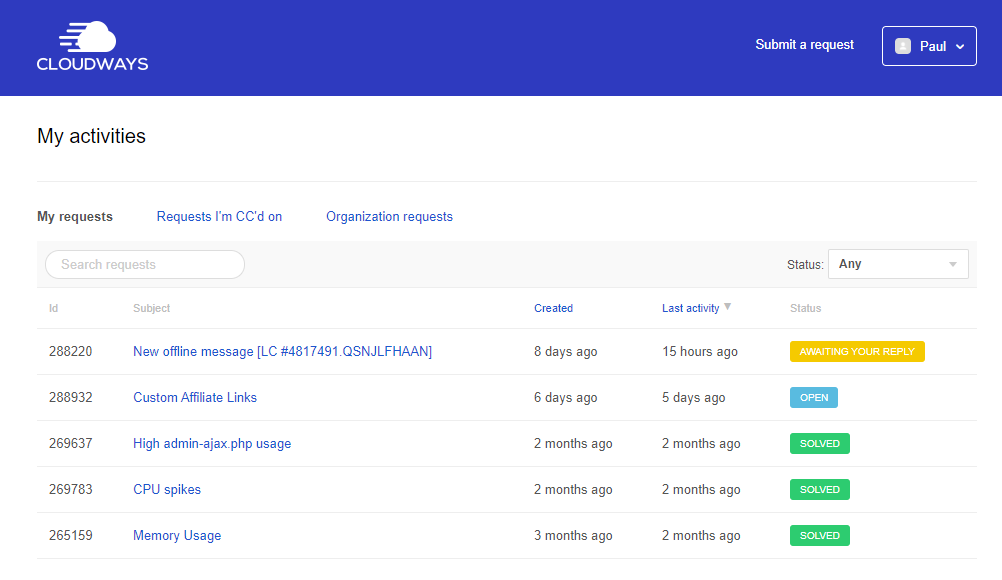
If you want support to take a closer, more detailed look into your inquiry, you should start a ticket instead of using live chat.
Unfortunately, I found that ticket support was not a whole lot better than live chat support, and also, it can sometimes take days to get a response.
The English of ticket support agents is good and easily understandable, but there is no guarantee that they will be able to solve your problem or address your concern. It seems like each reply you receive is from a different agent, which is a little weird.
For example, I thought that ticket support would really be able to look into my admin-ajax.php issue and clear everything up for me. But after two weeks of back-and-forth in which they didn’t answer most of my questions, it didn’t really go anywhere.
Summary
Look, I’m not saying that Cloudways support is horrible. It’s just okay. When there’s an important issue at hand, they’ll almost always be able to solve the problem.
There are multiple support options at your disposal, including live chat, ticket support, a community forum, and a Knowledge Base.
The Knowledge Base is very fleshed-out and helpful; you’ll find that you can often get answers to your questions there. One of the best ways to find the correct article is to type [your inquiry + Cloudways] into a search engine like Google.
2. It doesn’t offer email hosting.

Unlike other mainstream web hosts, Cloudways does not provide servers for email hosting. This means that in order to have custom domain email addresses, you’ll need to use the services of a third party.
This may be intimidating for a beginner that doesn’t know much about websites, but it’s really not a big deal and totally manageable.
Even though Cloudways doesn’t offer email hosting directly, they make it easy to set up email with their Rackspace email hosting add-on. This sets you up with a robust, 24/7 email hosting solution and all that is needed is to enable it in the “Add-Ons” section within the Cloudways platform.
Alternatively, you can find solid email hosting solutions outside of Cloudways. One method that many people suggest is just to sign up for a cheap shared hosting plan that includes unlimited email addresses.
What I personally do is use MXroute, which allows for unlimited email addresses and unlimited domains at a very affordable price. What’s great about them is that they don’t charge per mailbox. This, in my opinion, is a better option than getting crappy email hosting included in a shared web hosting plan.
3. It doesn’t support the PHP mail() function for WordPress by default.
One of the major snags I ran into when setting up my websites on Cloudways was the fact that contact forms wouldn’t work. My contact form, for example, would mark a message as being sent, but it would never arrive in my mailbox.
After some digging, I discovered that Cloudways didn’t support the PHP mail() function by default on their servers. This is one of the methods that WordPress can use to send emails from the website.
You don’t have to worry about this with most mainstream web hosts, so it was disappointing. You can probably enable PHP mail() on your Cloudways server somehow, but it’s not a straightforward task for a non-developer.
To get around this, you need to configure SMTP for your server within the Cloudways platform, and you’ll need the SMTP info for your email hosting or Elastic Email to do it. You will also need to install an SMTP plugin on your site in order to tell WordPress to send emails through SMTP and not PHP.
Although SMTP is generally considered to be superior compared to the PHP mail() function, it still requires some extra steps and adds extra complexity to running your website. Contact forms on your WordPress site should simply work out-of-the-box as it does with other hosts.
Cloudways Pricing
The base costs (in USD) of Cloudways plans, which are subject to change, are displayed in the table below.
| Tier 1 | Tier 2 | Tier 3 | Tier 4 | |
| DigitalOcean | $10/mo | $22/mo | $42/mo | $80/mo |
| DigitalOcean Premium | $12/mo | $26/mo | $50/mo | $96/mo |
| Linode | $12/mo | $24/mo | $50/mo | $90/mo |
| Vultr | $11/mo | $23/mo | $44/mo | $84/mo |
| Vultr High Frequency | $13/mo | $26/mo | $50/mo | $100/mo |
| AWS | $36.51/mo | $86.77/mo | $176.26/mo | $274.33/mo |
| Google Cloud | $33.18/mo | $73.50/mo | $138.52/mo | $225.93/mo |
The three main (but not the only) factors that determine the total monthly cost of Cloudways hosting are: the infrastructure provider, the amount of resources assigned to the server, and the amount of offsite backup storage used.
Infrastructure Provider
As previously indicated, Cloudways currently offers hosting from five infrastructure providers: DigitalOcean, Linode, Vultr, Amazon Web Services (AWS), and Google Cloud.
Each provider has many data centers around the world. DigitalOcean has the fewest, while AWS has the most.
DigitalOcean, Linode and Vultr are considered the “affordable” options for hosting, and for most online business owners, they are more than sufficient. But one thing to keep in mind is that unlike with AWS and Google Cloud, scaling up a server is permanent and irreversible unless a server clone is created.
As you might suspect, DigitalOcean Premium and Vultr High Frequency are more powerful servers (better memory and faster CPUs) than their corresponding standard versions. I myself am on a Vultr HF server, and I definitely think they’re worth the few extra dollars per month.
Server Resources
Arguably the biggest determiner of cost is the amount of resources assigned to a server.
The four resource metrics that affect the cost of a Cloudways plan are RAM, CPU cores, storage and bandwidth. Obviously, the more you have of these, the higher the cost will be.
The RAM is the memory available to a server. DigitalOcean, Linode and Vultr offer 1GB-8GB of RAM depending on the plan tier. For websites that are newly created, 1GB is certainly enough, but it’s definitely a good idea to upgrade to at least 2GB as your site gets larger and you add more applications.
The number of CPU cores offered can be anywhere from 1-4. On Cloudways, higher core counts are associated with more RAM, and they allow your server to handle high process loads and traffic stress more easily.
Storage (SSD) space on a server can be as high as 256GB on the highest-tier Vultr plan. Typical content blogs will do just fine with 32GB-64GB, but certain media-heavy websites may need more storage space. AWS and Google Cloud plans have configurable disk space.
It’s up to you to determine how much disk space will be most suitable to your situation. Keep in mind that your operating system will take up a decent chunk of your disk space, regardless of the size of your applications themselves.
The typical range for bandwidth is 1TB-5TB. My websites get around 100,000 visits per month and don’t even use a terabyte of bandwidth, so you shouldn’t need to worry about this too much.
Offsite Backup Storage
If you take automatic backups of your applications, Cloudways charges a small fee to store them in an off-site location. The charge is $0.033 per GB of backup storage.
To put this in perspective, I tell Cloudways to take daily server backups and store them for two weeks, and my backup storage charges are only about 50 cents. It’s practically nothing.
You can read more about offsite backup charges here.
There are other factors that can influence the monthly cost of hosting, namely optional add-ons.
What’s awesome about Cloudways is that it’s a pay-as-you-go system. You only pay for the resources your server uses and you don’t have to enter into contracts longer than one month. This is in contrast to mainstream web hosts like SiteGround which tend to lock you into billing cycles of one year or longer.
Frequently Asked Questions
In this section, I’m going to cover some common questions that I get regarding Cloudways.
Who owns Cloudways?
It’s difficult to say what the ownership profile of Cloudways is. However, it was founded by Uzair Gadit, Aaqib Gadit, and Pere Hospital. According to available information, Pere is the CTO, Aaqib is the CEO, and Uzair is Director of the company.
Cloudways currently has offices in Malta and Pakistan.
The company describes itself as “a managed cloud hosting platform where teams can build, deploy, scale & manage phenomenal web applications”. They say that they are committed to freedom of choice and simplifying the task of running a high-performance web server.
You can read more about Cloudways, their mission and their values here.
Which Cloudways plan do you recommend?
It depends on what your goals are, but because this is an internet marketing blog, I’ll gear what I’m about to say towards blogs about online business. The idea is practically the same with e-commerce stores and local business websites.
If you plan to choose a server location in the United States, I would go with Vultr, and in particular, their High Frequency server. Vultr offers a large number of data centers around the world.
As I’ve mentioned, I am on a Vultr High Frequency server, and I have been extremely pleased with the performance. The only hiccups have been rare, short downtime periods as a result of occasional maintenance.
If you’re already getting a solid amount of traffic to your web properties, you should start with the Tier 2 plan that comes with 2GB of RAM and increase the server resources as needed. Most blogs will not need much more than this.
I think that there’s almost no reason not to choose a High Frequency server, as it’s only $2-$6 more per month. You’ll get a more powerful CPU, better memory, and slightly faster speeds. Given the already low monthly cost (we’re not talking about $100+ per month here), it’s really a no-brainer.
Now, let’s set aside AWS and Google Cloud — I would not consider these providers unless your applications demand a very high amount of power and resources. With regards to DigitalOcean, Linode and Vultr, they are all very good and have similar performance.
Having said all this, you can absolutely try a DigitalOcean Premium server or a Linode server if you want. In the grand scheme of things, it’s not really important.
Regardless of the plan you choose, Cloudways will manage all the tricky technical aspects for you, and this is the most valuable aspect of Cloudways hosting.
How many sites can you host on Cloudways?
All Cloudways plans allow you to install unlimited applications or websites.
There’s no need to worry about any limits in this regard, but keep in mind that the more websites you put on a server, the more resources you will need (depending on how much traffic each site gets), and there will come a point where you’ll need to either launch a new server or increases the resources of your existing server.
How does Cloudways compare with Bluehost?

Bluehost and Cloudways are both web hosting companies, but they’re quite different.
For starters, Bluehost doesn’t even offer cloud hosting anymore. They offer shared, VPS and dedicated hosting, while Cloudways obviously only offers cloud hosting.
Bluehost was founded in 1996 by Matt Heaton and is based in the USA, unlike Cloudways which is based in the European island of Malta.
I actually wouldn’t recommend Bluehost under any circumstance, even if you’re looking for a shared hosting plan. They have always been known to be slow with relatively poor performance compared to other hosts that offer shared hosting like SiteGround. They also have a history of poor, offshored customer support.
You can read the full review of Bluehost I wrote a while ago here.
How does Cloudways compare with SiteGround?

SiteGround is a Bulgarian company that was founded in 2004 by Ivo Tzenov. Back when I ran my websites on shared servers, they were my web host of choice.
SiteGround offers shared hosting solutions and cloud hosting, but they don’t appear to offer dedicated hosting anymore.
Is SiteGround still the web host I would recommend for shared hosting? Probably, but I think other hosts have closed the performance gap in the last couple years. They have lost some of the advantage they used to have, but they’re still very good.
Having said that, the only situation in which I would recommend shared hosting over Cloudways’ cloud hosting is if you’re a beginner to hosting websites and you don’t want to deal with getting separate email hosting and setting up SMTP (even though it’s not hard for any non-techie to do).
Aside from that, there’s absolutely no reason to purchase SiteGround hosting. Their prices have gone up; their monthly shared hosting plans are actually more expensive than Cloudways hosting and deliver inferior performance.
More than this, you’ll need to enter into a contract with SiteGround of at least one year. They also offer cloud hosting but the prices are ridiculous at $100-$400/month.
SiteGround shared hosting can be a good way to jump into the realm of hosting websites, but in general, you’re better off heading straight to Cloudways. If you’re interested, you can read my full review of SiteGround here.
Who is Cloudways for?

Although Cloudways advertises their platform for developers, digital agencies and e-commerce stores, Cloudways works well with practically any business or website including blogs. This is because you can scale server resources to meet your needs.
I myself host affiliate marketing blogs on Cloudways and it works beautifully.
Tip: If your websites get an extremely large amount of traffic or experience dramatic spikes in traffic at certain times of the year, it’s probably a good idea to launch an AWS or Google Cloud server because they can be upscaled and downscaled easily.
Why choose Cloudways?
Here’s the best way I can put this: Cloudways gives you blazing-fast website speeds, high performance, and strong security at a monthly cost that is similar to or cheaper than shared hosting (regular rates) from “mainstream” web hosts.
So, with Cloudways, you’re basically getting way better hosting performance for the same amount of money, except it can be considered even cheaper because you’re not locked into an annual contract.
Cloudways eliminates the tech barrier that prevents most people from accessing this type of economical hosting, so that even non-developers can enjoy the huge advantages that come with it. I don’t know of any other web host that offers managed cloud hosting at such a good price.
Of course, Cloudways isn’t perfect. It has some shortcomings, but if you can accept them like I did, you’ll be able to reap the benefits for years to come.
Conclusion
When I was doing my research on web hosting after I decided to leave SiteGround, I kept noticing how often Cloudways came up. People would say how much faster and better it is and how it was the best decision they ever made to make the switch.
As someone who was in that situation and gave Cloudways a try, I’m very pleased to say that my results lived up to the hype. You’d be hard-pressed to find these kinds of incredible speeds and uptime for such an affordable price anywhere else.
Indeed, I strongly recommend Cloudways hosting, both for people who already have some experience hosting websites and for beginners as well. Whether you have a blog, e-commerce store, agency business, small business website, or practically anything else, you will have success with Cloudways.
This is despite their lackluster customer support and lack of email hosting. These things aren’t really a big deal because support more or less gets the job done and it’s straightforward for a non-techie to get separate email hosting set up.
I strongly urge beginners, in particular, to consider skipping “entry-level” shared hosting altogether and go straight to Cloudways cloud hosting. Once the promotional period for a shared hosting plan elapses, you’ll be paying the same or even more per month than you would for a superior Cloudways plan.
Website owners already with an existing web host have several options for quickly, smoothly and easily migrating their websites to Cloudways. Trust me, you won’t regret it.
So take advantage of the free trial, get in there, try it out, and see the performance for yourself.
Thanks for reading my Cloudways review. This review contains affiliate links for Cloudways that I may receive a commission from. Note that the views expressed here are my own and are not official statements by Cloudways.
Cloudways
Pros
- Blazing fast speeds with the strong benefits that come with cloud hosting
- Extremely economical
- A unique stack and caching system puts performance on another level
- The user area is so easy to use
- One free professional website transfer
Cons
- Customer support should be improved
- Email hosting is not included in plans
- WordPress mail doesn't work out-of-the-box




